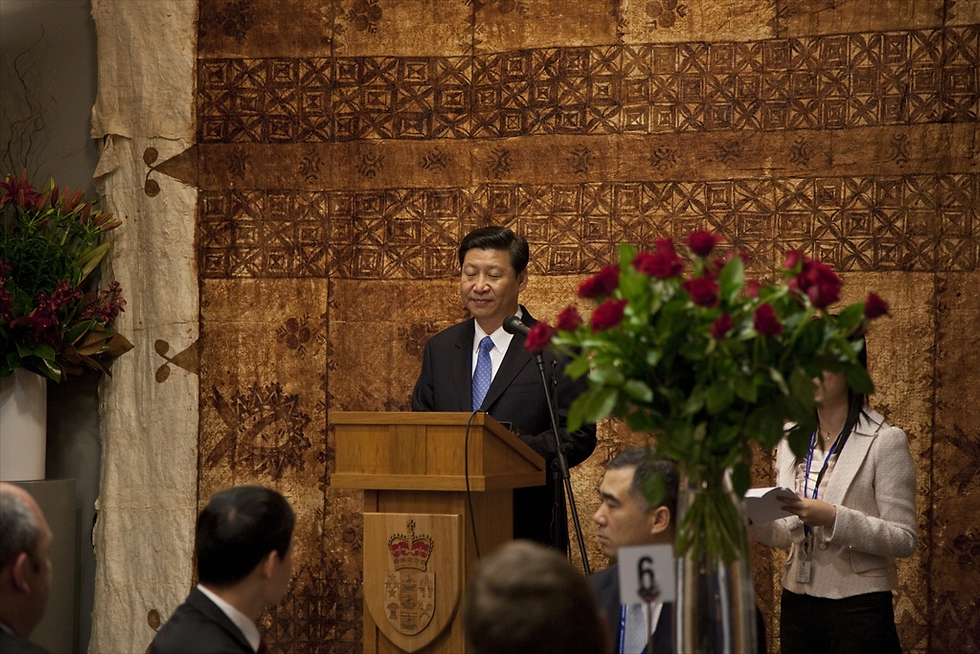Danger in the Waters: The Growing Conflict Between China and the Philippines
- MGMMTeam

- Apr 18, 2024
- 4 min read
Introduction
The long-simmering territorial disputes in the South China Sea have erupted into dangerous confrontations between Chinese and Philippine vessels, ratcheting up tensions in the hotly contested waters. This week's incidents, which resulted in collisions and injuries to Filipino sailors, have drawn international condemnation and thrust the region's maritime disputes back into the global spotlight. As both sides trade accusations and vow firm responses, fears are growing of an unintended escalation that could draw in other regional powers.
"Chinese Vice President Xi Jinping" by nznationalparty is licensed under CC BY-NC-ND 2.0.
The Incidents
The clashes occurred as Philippine coast guard ships attempted to reach the Segunda Thomas Shoal, known as Ayungin Shoal by the Philippines, to resupply and rotate personnel stationed on the BRP Sierra Madre – a rusting Philippine navy ship that has been grounded on the shoal since the late 1990s. China also claims the shoal and has deployed coast guard and maritime militia vessels to prevent the Philippines from fortifying its presence there.
According to Philippine officials, Chinese coast guard ships blocked and collided with the Philippine vessels early Tuesday, causing minor damage to one coast guard ship, the BRP Sindangan. Over an hour later, another Chinese vessel rammed into a Philippine supply boat, shattering its windshield with water cannon blasts and injuring at least four Filipino crew members.
Reactions and Accusations
The Philippine government condemned what it called China's "unprovoked acts of coercion and dangerous maneuvers," stating that the Chinese actions "put the lives of our people at risk and caused actual injury to Filipinos." Manila summoned China's deputy ambassador to lodge a formal protest and demanded that Chinese vessels immediately leave the vicinity of the shoal.
China's defense ministry fired back, accusing the Philippines of being the aggressor and "infring[ing] on rights and provok[ing] and creat[ing] trouble at sea." Beijing claimed that a Philippine ship deliberately rammed a Chinese coast guard vessel, causing minor damage.
International Condemnation
The United States, which is treaty-bound to defend the Philippines, strongly condemned China's actions, with State Department spokesman Matthew Miller stating that the incidents demonstrated China's "reckless disregard for the safety of Filipinos and also for international law." Washington's ambassador in Manila, MaryKay Carlson, reiterated that the U.S. stands with the Philippines and "proponents of international law."
Other nations, including Australia and Japan, have also expressed concern over China's behavior, underscoring the potential for the dispute to escalate into a wider regional conflict.
The Philippine Position
For the Philippines, the latest incidents represent a serious challenge for President Ferdinand Marcos Jr., who has vowed to defend his country's territorial claims while also seeking to maintain cordial ties with China, a major economic partner. In remarks this week, Marcos struck a defiant tone, stating that the Philippines "will not be cowed into silence, submission, or subservience" and vowing to implement "countermeasures" against China's "open, unabating, and illegal, coercive, aggressive, and dangerous attacks."
The Philippine leader's tough rhetoric marks a departure from the more conciliatory approach taken by his predecessor, Rodrigo Duterte, who was accused of being too accommodating to China's maritime claims. Marcos has sought to clarify his position, expressing surprise at a purported "gentleman's agreement" between Duterte and Chinese President Xi Jinping to maintain the status quo in the disputed waters.
Escalating Tensions
As the war of words between Manila and Beijing escalates, the risk of miscalculation or unintended escalation grows. Both sides have accused the other of provocative actions and spreading disinformation, raising the specter of a potential military confrontation.
The U.S. has warned that it is obligated to defend the Philippines if Filipino forces, ships, or aircraft come under armed attack, including in the South China Sea. China has repeatedly cautioned Washington against meddling in what it deems a strictly regional affair.
The Broader Context
The standoff has also highlighted the complex web of alliances and rivalries in the region, with the Philippines seeking to balance its security interests with its economic ties to China. Other nations, such as Vietnam, Malaysia, and Taiwan, have their own claims in the South China Sea and are closely watching the unfolding events.
The disputes in the South China Sea have been simmering for decades, with China claiming sovereignty over virtually the entire sea based on its controversial "nine-dash line," which was ruled invalid by an international tribunal in 2016. Brunei, Malaysia, Vietnam, and Taiwan also have overlapping claims to the strategic waterway, a major global trade route which is also believed to be sitting atop rich undersea deposits of oil and gas.
The Road Ahead
As tensions continue to simmer, the prospects for a peaceful resolution to the dispute appear increasingly remote. With both China and the Philippines taking unyielding stances and unwilling to back down, the stage may be set for further confrontations and escalating brinkmanship in one of the world's most strategically vital waterways.
The Philippines has stated that its planned countermeasures against China will be comprehensive and will include diplomatic efforts. President Marcos has additionally advocated for enhanced collaboration on maritime security to address various significant threats to territorial sovereignty and peace in the region.
However, with neither side showing signs of backing down, the risk of a miscalculation leading to a wider conflict remains high. The international community will be watching closely as the tense standoff in the South China Sea continues to unfold.





Comments